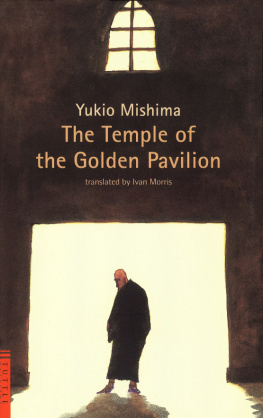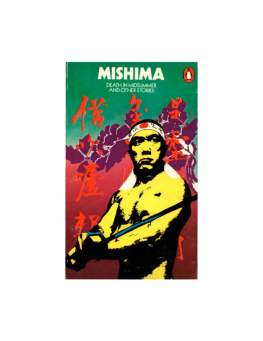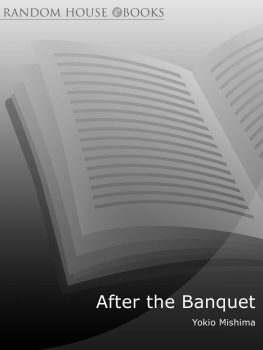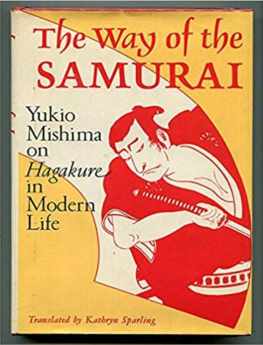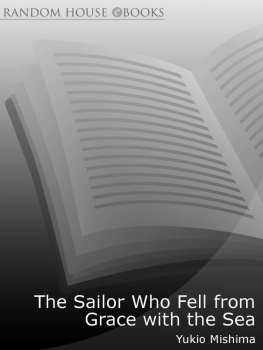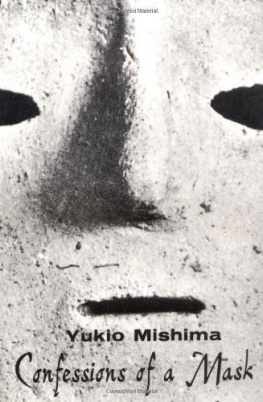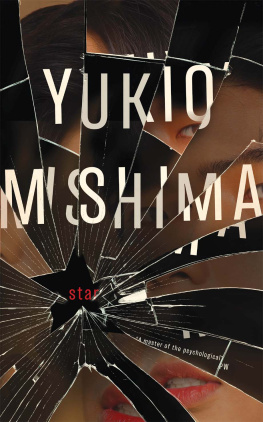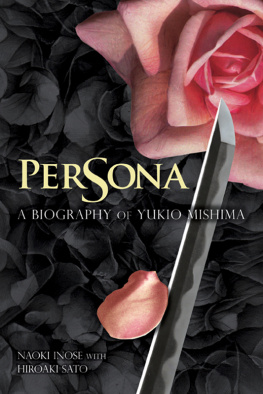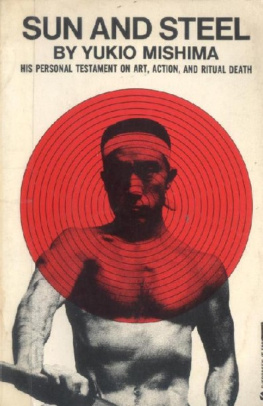Patriotism
Yukio Mishima,
translated from the Japanese by Geoffrey S. Sargent 1
On the twenty-eighth of February, 1936 (on the third day, that is, of the February 26 Incident), Lieutenant Shinji Takeyama of the Konoe Transport Battalionprofoundly disturbed by the knowledge that his closest colleagues had been with the mutineers from the beginning, and indignant at the imminent prospect of Imperial troops attacking Imperial troops- took his officers sword and ceremonially disemboweled himself in the eight-mat room of his private residence in the sixth block of Aoba-cho, in Yotsuya Ward. His wife, Reiko, followed him, stabbing herself to death. The lieutenants farewell note consisted of one sentence: Long live the Imperial Forces. His wifes, after apologies for her unfilial conduct in thus preceding her parents to the grave, concluded: The day which, for a soldiers wife, had to come, has come. The last moments of this heroic and dedicated couple were such as to make the gods themselves weep. The lieutenants age, it should be noted, was thirty-one, his wifes twenty-three; and it was not half a year since the celebration of their marriage.
2
Those who saw the bride and bridegroom in the commemorative photographperhaps no less than those actually present at the lieutenants weddinghad exclaimed in wonder at the bearing of this handsome couple. The lieutenant, majestic in military uniform, stood protectively beside his bride, his right hand resting upon his sword, his officers cap held at his left side. His expression was severe, and his dark brows and wide gazing eyes well conveyed the clear integrity of youth. For the beauty of the bride in her white over-robe no comparisons were adequate. In the eyes, round beneath soft brows, in the slender, finely shaped nose, and in the full lips, there was both sensuousness and refinement. One hand, emerging shyly from a sleeve of the over-robe, held a fan, and the tips of the fingers, clustering delicately, were like the bud of a moonflower.
After the suicide, people would take out this photograph and examine it, and sadly reflect that too often there was a curse on these seemingly flawless unions. Perhaps it was no more than imagination, but looking at the picture after the tragedy it almost seemed as if the two young people before the gold-lacquered screen were gazing, each with equal clarity, at the deaths which lay before them.
Thanks to the good offices of their go-between, Lieutenant General Ozeki, they had been able to set themselves up in a new home at Aoba-cho in Yotsuya. New home is perhaps misleading. It was an old three-room rented house backing onto a small garden. As neither the six- nor the four and-a-half-mat room downstairs was favored by the sun, they used the upstairs eight-mat room as both bedroom and guest room. There was no maid, so Reiko was left alone to guard the house in her husbands absence.
The honeymoon trip was dispensed with on the grounds that these were times of national emergency. The two of them had spent the first night of their marriage at this house. Before going to bed, 1
Shinji, sitting erect on the floor with his sword laid before him, had bestowed upon his wife a soldierly lecture. A woman who had become the wife of a soldier should know and resolutely accept that her husbands death might come at any moment. It could be tomorrow. It could be the day after. But, no matter when it camehe askedwas she steadfast in her resolve to accept it? Reiko rose to her feet, pulled open a drawer of the cabinet, and took out what was the most prized of her new possessions, the dagger her mother had given her. Returning to her place, she laid the dagger without a word on the mat before her, just as her husband had laid his sword. A silent understanding was achieved at once, and the lieutenant never again sought to test his wifes resolve.
In the first few months of her marriage Reikos beauty grew daily more radiant, shining serene like the moon after rain.
As both were possessed of young, vigorous bodies their relationship was passionate. Nor was this merely a matter of the night. On more than one occasion, returning home straight from maneuvers, and begrudging even the time it took to remove his mud-splashed uniform, the lieutenant had pushed his wife to the floor almost as soon as he had entered the house. Reiko was equally ardent in her response. For a little more or a little less than a month, from the first night of their marriage Reiko knew happiness, and the lieutenant, seeing this, was happy too.
Reikos body was white and pure, and her swelling breasts conveyed a firm and chaste refusal; but, upon consent, those breasts were lavish with their intimate, welcoming warmth. Even in bed these two were frighteningly and awesomely serious. In the very midst of wild, intoxicating passions, their hearts were sober and serious.
By day the lieutenant would think of his wife in the brief rest periods between training; and all day long, at home, Reiko would recall the image of her husband. Even when apart, however, they had only to look at the wedding photograph for their happiness to be once more confirmed. Reiko felt not the slightest surprise that a man who had been a complete stranger until a few months ago should now have become the sun about which her whole world revolved.
All these things had a moral basis, and were in accordance with the Education Rescripts injunction that husband and wife should be harmonious. Not once did Reiko contradict her husband, nor did the lieutenant ever find reason to scold his wife. On the god shelf below the stairway, alongside the tablet from the Great Ise Shrine, were set photographs of their Imperial Majesties, and regularly every morning, before leaving for duty, the lieutenant would stand with his wife at this hallowed place and together they would bow their heads low. The offering water was renewed each morning, and the sacred sprig of sasaki was always green and fresh. Their lives were lived beneath the solemn protection of the gods and were filled with an intense happiness which set every fiber in their bodies trembling.
3
Although Lord Privy Seal Saitos house was in their neighborhood, neither of them heard any noise of gunfire on the morning of February 26. It was a bugle, sounding muster in the dim, snowy dawn, when the ten-minute tragedy had already ended, which first disrupted the lieutenants slumbers. Leaping at once from his bed, and without speaking a word, the lieutenant donned his uniform, buckled on the sword held ready for him by his wife, and hurried swiftly out into the snow-covered streets of the still darkened morning. He did not return until the evening of the twenty eighth.
Later, from the radio news, Reiko learned the full extent of this sudden eruption of violence. Her life throughout the subsequent two days was lived alone in complete tranquility and behind locked doors.
2
In the lieutenants face, as he hurried silently out into the snowy morning, Reiko had read the determination to die. If her husband did not returns her own decision was made: she too would die.
Quietly she attended to the disposition of her personal possessions. She chose her sets of visiting kimonos as keepsakes for friends of her schooldays, and she wrote a name and address on the stiff paper wrapping in which each was folded. Constantly admonished by her husband never to think of the morrow, Reiko had not even kept a diary and was now denied the pleasure of assiduously rereading her record of the happiness of the past few months and consigning each page to the fire as she did so.
Ranged across the top of the radio were a small china dog, a rabbit, a squirrel, a bear, and a fox. There were also a small vase and a water pitcher. These comprised Reikos one and only collection. But it would hardly do, she imagined, to give such things as keepsakes. Nor again would it be quite proper to ask specifically for them to be included in the coffin. It seemed to Reiko, as these thoughts passed through her mind, that the expressions on the small animals faces grew even more lost and forlorn.
Next page

